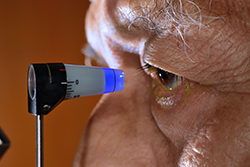
Why Are Eye Exams so Important?
It is not common that you would schedule an eye exam when your eyes feel fine. What many people do not realize is that many degenerative eye diseases cannot be felt. Glaucoma, for example, is painless and is often referred to as the sneak thief of sight.
Routine eye examinations are important even if our eyes and vision are fine. Let’s learn from the past and history of eye disease and encourage regular eye exams. It can save vision.
Diabetic Eye Disease is the Leading Cause of Blindness
It may be no secret that diabetes is a very serious disease that has widespread effects on various parts of the body and the eyes are one of them. The most common cause of blindness in the United States is a diabetic eye disease. In the early stages, when it is most easily treated, diabetic eye disease has no symptoms. The only way for a diabetic to know if he or she has diabetic eye disease is to get routine eye examinations at least once a year.
Diabetic retinopathy is a disease that affects diabetic people and eventually leads to blurriness, distorted vision, and eventually loss of vision. When people suffer from diabetes they may often have unstable glucose levels and they are prone to circulation problems in the back of the eye, known as the Retina. If you are diabetic our eye doctors will be happy to schedule an appointment to evaluate the impact of diabetes on your vision.

Glaucoma is the Silent Thief of Sight
Do you have a family history of glaucoma? If so please schedule an eye exam. Glaucoma is the second most common cause of blindness. Glaucoma is called the sneak thief of sight because it has no symptoms at all until the disease is very advanced.
Once your vision is lost through glaucoma, it can never be regained. The only way to know if you have glaucoma is to have a comprehensive eye examination on a regular basis.
Are you over 50 years old?
Macular degeneration is the most common cause of blindness in this age category. In the early stages of macular degeneration, treatments may be used to slow or prevent the progression of the disease. Patients typically have no symptoms at all in the early stages so coming in for an eye exam is the last thing on their mind.
With busy schedules and the pressures of the modern working environment, it’s probably the last thing you would think about. The only way to know if you have early macular degeneration is to have routine eye examinations even if your eyes seem healthy.
Locations for Your Eye Exams
Please choose from one of the following locations to schedule an eye exam. Our staff is ready to assist with scheduling your next eye appointment.












